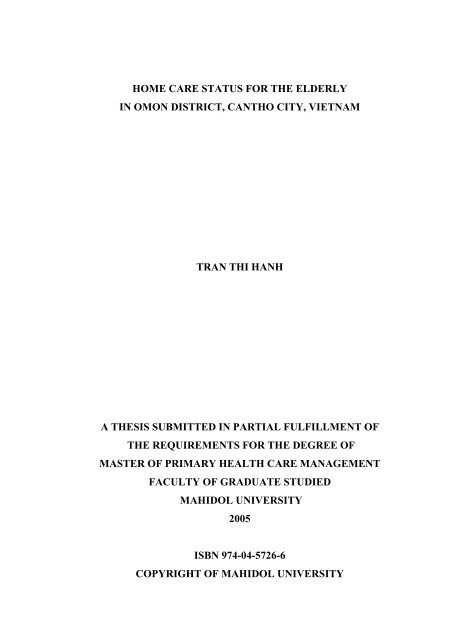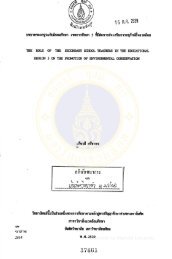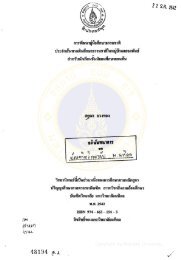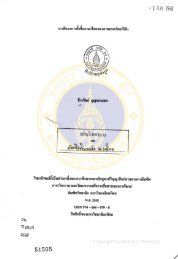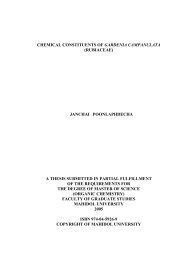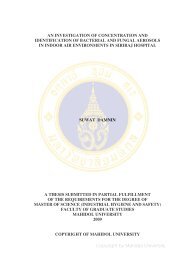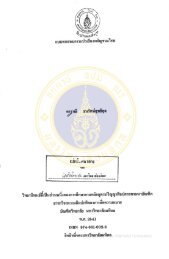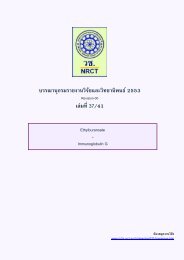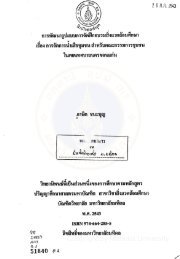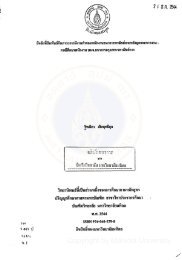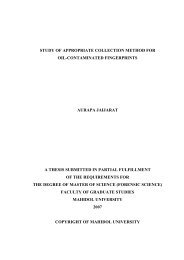Abstract - Mahidol University
Abstract - Mahidol University
Abstract - Mahidol University
Create successful ePaper yourself
Turn your PDF publications into a flip-book with our unique Google optimized e-Paper software.
HOME CARE STATUS FOR THE ELDERLY<br />
IN OMON DISTRICT, CANTHO CITY, VIETNAM<br />
TRAN THI HANH<br />
A THESIS SUBMITTED IN PARTIAL FULFILLMENT OF<br />
THE REQUIREMENTS FOR THE DEGREE OF<br />
MASTER OF PRIMARY HEALTH CARE MANAGEMENT<br />
FACULTY OF GRADUATE STUDIED<br />
MAHIDOL UNIVERSITY<br />
2005<br />
ISBN 974-04-5726-6<br />
COPYRIGHT OF MAHIDOL UNIVERSITY
Fac. Of Grad. Studies, <strong>Mahidol</strong>. Univ. Thesis / iv<br />
HOMECARE STATUS FOR THE ELDERLY IN OMON DISTRICT, CANTHO<br />
CITY, VIETNAM<br />
TRAN THI HANH 4737969 ADPM / M<br />
M.P.H.M. (PRIMARY HEALTH CARE MANAGEMENT)<br />
THESIS ADVISORS: WIRAT KAMSRICHAN, Ph.D., JUMROON MIKHANORN,<br />
M.D., M.P.A., D.P.H., CHOUNCHOM CHAROENYOOTH, Ph.D.<br />
ABSTRACT<br />
The aim of this crossectional descriptive study was to reveal homecare status<br />
and define the factors relating to it for the elderly in Omon District, Cantho City,<br />
Vietnam. The respondents, consisting of 171 elderly, were interviewed through a<br />
structured questionnaire in order to collect data refor the elderlyecting demography<br />
and socio-economic status, health belief, family and community resources, needs for<br />
health care and homecare status. The respondents’s age ranked from 60 to 98, of<br />
which those 90 and over occuppied 5%. Of the subjects, 66% of them were female,<br />
58% were married; 67% were household head, 37% were illiterate, 41% were without<br />
a monthly allowance, 94% had family members with a poor income.<br />
The study results showed that 91% of the elderly used self-care for their daily<br />
activities and 51% of them use self-care when sick; 84% of them had chronic<br />
diseases, of which multiple diseases were the most common type (23%); 51% of them<br />
perceived that their health status was poor; the highest percentage of discomfort or<br />
minor illness was back-ach or join-ach (42%) but 57% of them ignored their<br />
discomfort or minor illness.<br />
For the factors relating needs for health care, chronic disease is related to the<br />
area where the elderly live; perceived health status depended on age, education,<br />
working status and house condition of the elderly. Age and working status is<br />
associated to self-care of the elderly. The results also refor the elderlyect the<br />
relationship between self-care and needs for health care of the elderly.<br />
The researcher suggests that annual health care check-ups for the elderly<br />
should be carried out and that it is necessary to encourge the elderly to care about<br />
their discomfort or minor illnesses.<br />
KEY WORDS: ELDERLY HOMECARE SELF-CARE<br />
117 P. ISBN 974-04-5726-6


